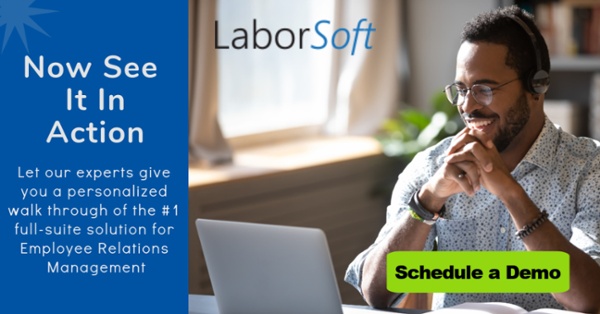Compliance & Legal | Employee Relations
Guide to HR Investigations, Compliance, and Employee Rights
Read Time 9 mins | Sep 18, 2025 | Written by: LaborSoft

HR investigations sit at the intersection of employee trust, organizational integrity, and legal risk. When handled well, they reinforce a company’s commitment to important ideals. Your approach could, for instance, build upon your organization’s reputation for positive traits like:
- Fairness
- Transparency
- Accountability
- Respect for workers’ rights
These qualities can be a driving force behind strong employee retention metrics or successful hiring initiatives. However, a poorly managed investigation can have the opposite impact: damaged morale, claims of retaliation or discrimination, or even an open door to costly lawsuits.
There’s no room for inconsistency from HR leaders. Investigations must follow clear, documented procedures while balancing the needs of the organization with the rights of employees.
Explore the following set of best practices for conducting HR investigations to keep your processes practical, rigorous, and consistent (and defensible!). It’s a high-level framework, but you can adapt it to your own policies so the final procedures comply with local employment law and industry standards.
You'll also see how purpose-built HR case management software can support your team and simplify recordkeeping, which helps you to avoid the hidden risks of a more ad hoc approach.
Table of Contents
- The Role of HR Investigations in a Fair Workplace
- Consistent Processes and Documentation Standards
- Employee Grievances and Arbitration Procedures
- Broader Compliance Obligations
- Technology for HR Teams
- Partner with LaborSoft for Confident Case Management
The Role of HR Investigations in a Fair Workplace
HR investigations are among the most sensitive and high-stakes tasks your team handles. The core of the process may be the resolution of a dispute, but investigations also play a role in showing your company's broader commitment to ideals like fairness, legal compliance, and employee trust — all important to positive employee relations.
Effective investigations have clear goals: fairness, impartiality, safeguarding of employee rights and confidentiality, legal compliance, the resolution of the root issue, and protection of the organization's reputation. Yes, it can seem like a long list...but that’s part of what makes investigations such a sensitive needle to thread.
Every HR professional knows from experience that these cases can be emotional and tense. Employees may be worried about retaliation or may (naturally) feel defensive. It’s critical to maintain a clear structure and neutral stance.
Your impartiality will depend upon a standardized process that doesn’t vary by department or manager. Neutral investigators, consistent interview questions, and clear role definitions can all act to reduce bias. It’s also wise — and worth it — to commit the time and resources to training your team. Sessions can support their ability to:
- Recognize implicit bias
- Follow defined procedures with precision
- Document each step carefully
- Avoid internal conflict and external legal challenges
Fairness and impartiality must be a major focus for your HR team throughout each investigation. Your employees will expect transparency about the process along with clear communication of expectations and guarantees around confidentiality (within legal limits). All of these can either build trust or destroy it, depending how things are handled.
Employees need to know, for sure, that they can share their side without fear of retaliation, and that you support employee rights during HR investigation practices.
Off-the-cuff remarks or personal judgments can derail trust and open the company to bias or retaliation claims. Maintain a professional, neutral tone at all times. Essentially, knowing what not to say in an HR investigation is as important as knowing what to ask!
Consistent Processes and Documentation Standards
Process Priorities
Model HR investigations start from a place of consistency. HR folks are humans, too. Without clear, repeatable steps, investigations can easily — and unintentionally — become biased, incomplete, or impossible to defend.
Define in advance how investigations will be conducted:
- Steps from intake to resolution
- Process timelines and deadlines
- Individual team member roles/responsibilities
- Confidentiality expectations
- Documentation and reporting processes
Make sure procedures are all documented and accessible for both HR staff and managers.
It helps if you set the expectation up front that documentation is not simply administrative formality. All team members should view it as essential legal and reputational protection. In the event that a complaint unfortunately escalates to litigation or arbitration, you’ll need a complete record showing what actions were taken, who was involved, and how decisions were made.
The Value of Complete Documentation
A comprehensive repository of case documentation should capture the full range of:
- Initial complaint details
- Interview notes
- Evidence gathered
- Analyses performed
- Case findings
- Final outcomes.
Timelines matter, too. When employees ask “how long do HR investigations take?”, the ultimate answer depends on complexity — but a consistent process can help to avoid unnecessary delays. A clearly defined HR investigation template provides a structured, repeatable path so teams don’t forget critical steps while also shortening investigation timelines.
Your approach to documentation matters just as much as your actual process. Email chains and spreadsheets are error-prone and hard to audit. Modern teams turn to secure HR document management solutions to centralize and back up all records. Collaboration is easier on the cloud, and centrally shared documents ensure the data consistency you need for accurate reporting and compliance.
Weak or missing documentation instantly introduces risk. Incomplete records make it monumentally harder to prove fairness and compliance in court or with regulators. Employees may claim retaliation or bias if there isn’t a reliable, complete paper trail.
The best way for your organization to mitigate these risks is with intuitive, purpose-built HR document management software with secure access controls, clear audit trails, and easy retrieval of investigation records. It can also be useful to review example templates for common case types or standardized investigation questions to further reduce risk and increase the credibility of your findings.
Employee Grievances and Arbitration Procedures
HR investigations often connect directly to broader employee grievance and arbitration systems. These processes are legal and ethical obligations that help organizations avoid discrimination, retaliation, or unfair labor practice claims.
Grievances are Controlled By Labor Law
A grievance process must be consistent, transparent, and aligned with internal policy and labor laws. Employers should define every step clearly: how employees submit a complaint, how it is reviewed, the investigation steps, responses, and any appeal processes.
Federal and state laws such as Title VII of the Civil Rights Act, the National Labor Relations Act (NLRA), and the Americans with Disabilities Act (ADA) impose clear requirements on grievance handling. Employers must ensure that managers and HR staff follow these rules carefully to avoid liability.
Confidentiality is equally important. Grievances often involve deeply personal information. HR must maintain strict access controls, secure both physical and digital records, and comply with federal and state privacy laws.
The Risks of Arbitration & Litigation
Failures in consistency or documentation can quickly escalate internal disputes to arbitration or litigation. Employee grievance procedures need to be airtight to protect both the company and its workforce.
Union environments often add layers of complexity. Collective bargaining agreements (CBAs) typically spell out timelines, required documentation, and arbitration steps. HR teams must be fully fluent in these terms to avoid violations that can trigger regulatory penalties or default arbitration outcomes.
Arbitration itself is common in unionized environments or employment agreements. It can reduce litigation risk, but only when clauses are clearly drafted and enforced correctly. They must be legally sound, easy to understand, and applied consistently.
A robust, centralized HR case management system simplifies all of these obligations with supporting tools like more standardized documentation, automated reminders, or even customizable union-specific case templates that match your CBA expectations/processes.
Broader Compliance Obligations
HR investigations are only one piece of the larger compliance puzzle for your organization. Issues with inconsistent processes, missing records, or inadequate tracking can slow down case resolution, but they also create direct legal risk even outside of the investigations themselves. Your HR team must know and document how its investigations connect to other legal, reporting, and compliance-related obligations.
Labor laws like Title VII, the ADA, and FMLA require transparent processes and fair outcomes (and reliable records to prove those outcomes!). Your HR policies should reflect these legal requirements, and your documentation practices should be robust enough to stand up to an audit, arbitration, or court case.
Investigations are also interconnected with other employee relations processes. Parental leave tracking is a classic example: policies and procedures have to navigate the overlap between federal FMLA requirements and state-specific paid leave rules. HR teams must maintain accurate records of leave requests, approvals, timelines, and communications, all of which may become relevant in the event of a grievance or legal dispute.
Moreover, employee grievances and investigations must be handled in a way that is defensible against claims of retaliation. The key is to maintain consistent HR investigation timelines and thorough records — these help to prove decisions were made fairly and avoid any uncertainties that could lead to dispute or escalate to legal challenges (or regulatory scrutiny).
Technology for HR Teams
Finally, HR investigations demand the right tools. Managing employee relations without purpose-built systems invites mistakes and gaps that carry real consequences. Outdated methods like spreadsheets or ad hoc email chains can create bottlenecks, miscommunication, and lost documentation.
A modern HR case management system is not ‘a place to store files.’ These systems are designed to:
- Enforce consistent processes (using automated alerts and easily accessible custom process documentation)
- Provide secure access controls for sensitive data
- Support collaborative investigations among HR, legal, and compliance teams
With conveniences like integrated reminders and task tracking, important deadlines don’t slip through the cracks — even in complex investigations with multiple stakeholders.
These systems also support clear reporting and audit trails, both of which are essential for demonstrating compliance with internal policies and external legal requirements. For example, when investigators have securely documented evidence, witness statements, process reminders, and interview notes in hand wherever they go, it’s easier to avoid the off-the-cuff remarks that can undermine trust or invite claims of bias.
Today’s forward-thinking organizations are adopting robust HR technology to improve investigation speed and reduce error rates. As a natural result, they’re also acting to protect valuable employee trust by demonstrating consistent practices. These tools — and this mindset — are a critical component of managing risk and avoiding litigation.
Partner with LaborSoft for Confident Case Management
Good intentions will only carry your organization so far. Effective HR investigations require repeatable processes with thorough documentation and the tools to make compliance easy. The LaborSoft HR case management platform is designed to support your team at every stage of the investigation process.
Our secure, centralized system helps your team track complaints, evidence, interviews, timelines, and outcomes, all while maintaining role-based access controls and audit-ready records. Give your HR professionals the tools they need to manage complex employee grievances and arbitration procedures with confidence and consistency.
Ready to strengthen your HR investigations and reduce legal risk? Book a demo to see how LaborSoft can simplify your employee relations case management!


